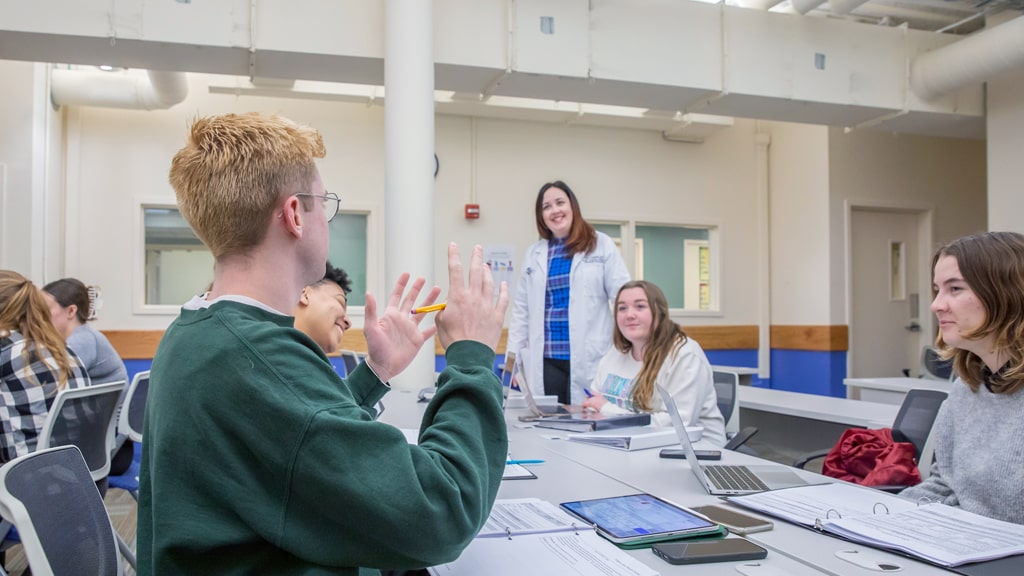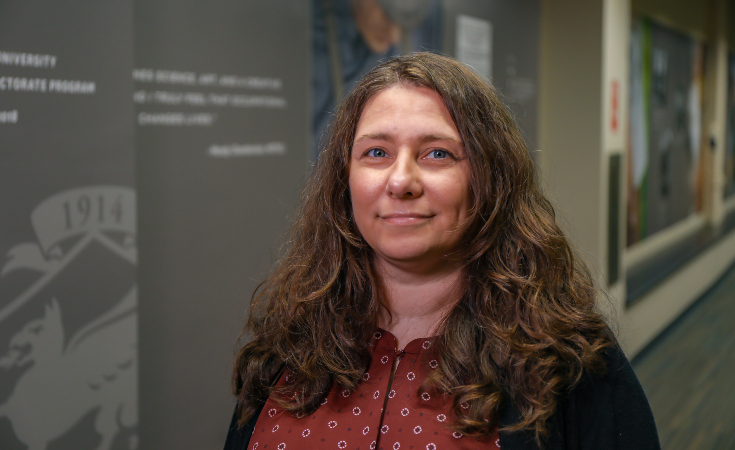Bachelor of Science
Dietetics and Applied Nutrition
Connecting Food, Nutrition and Health
WHAT’S THE CONNECTION between food, nutrition and health? What does it take to identify nutrition-related problems? How do we find solutions? JWU Providence’s Dietetics and Applied Nutrition bachelor of science degree explores these questions and more, preparing you for the path to becoming a Registered Dietitian Nutritionist (RDN).
You’ll focus on subjects ranging from nutrition science, culinary fundamentals and food service systems management. Taking classes like microbiology, chemistry and human physiology will deepen your understanding of nutrition principles. Your JWU education will prepare you to identify and diagnose nutrition problems, develop nutrition care plans and execute therapeutic menus.
Admissions is contingent upon meeting the technical standards for this program.
Request Information
Powered by Purpose
“My purpose is to impact the health of others through the way I know best — and that’s food.” In this video, Nina Palmer '22 discusses why she chose JWU’s DPD program.
Didactic Program in Dietetics (DPD) Advantages
 Our unique Didactic Program in Dietetics (DPD) program combines nutrition science with a culinary arts foundation.
Our unique Didactic Program in Dietetics (DPD) program combines nutrition science with a culinary arts foundation.
JWU’s program provides the academic framework to prepare students for graduate school* and supervised practice, leading to eligibility for the CDR credentialing exam to become an RDN.** Learn more about JWU’s M.S. in Clinical Nutrition & Dietetics (MSCND).
*Effective January 1, 2024, the Commission on Dietetic Registration (CDR) will require a minimum of a master’s degree to be eligible to take the credentialing exam to become a registered dietitian nutritionist (RDN).
**Individual states may require specific licensing or professional certification in addition to earning a degree in order to practice in the field. Learn more via the JWU Catalog’s Licensure & Professional Certification Disclosures.
“Dietetics and Applied Nutrition (DiAN) students take courses in nutrition and foundational sciences and are able to enhance their skillset with a unique culinary arts education. Our graduates truly understand the connection between nutrition science and food.” PROGRAM DIRECTOR MAEVE GUIDERA
Dietetics & Applied Nutrition Curriculum
Your Dietetics and Applied Nutrition degree builds upon a foundation of culinary arts courses that provide you with a unique skillset integrating culinary skills and nutrition knowledge. The foundational culinary courses in your first two years provide you with culinary expertise and techniques, leadership in the kitchen, and other essential skills.
Sample Courses
- Applied Culinary Nutrition
- Food Science
- Community Nutrition
- Human Physiology & Lab
- Introduction to Menu Planning & Cost Controls
- Lifespan Nutrition
- Medical Nutrition Therapy
- Therapeutic Cuisine
- Operational Management in Healthcare
In addition to your core classes, free elective credits can be applied to a number of options such as internships, minors or study abroad. You are encouraged to contact an advisor before scheduling free elective credits. Explore the full JWU Catalog course listing:
Career Possibilities
- Registered Dietitian
- Clinical Dietitian
- Pediatric Nutritionist
- Registered Dietitian Nutritionist
- Certified Nutrition Specialist
- Food Product Developer
- Dietetics Manager
Some professions may require additional study, background checks, certifications, licenses, exams and/or experience as required qualifications for employment. Students are responsible for verifying that they can meet the employment requirements of potential employers. For more information, review the JWU Catalog’s Licensure & Professional Certification Disclosures.
Featured Dietetics Faculty

Assistant Professor
Kerri Rush, M.S., RDN, LDN, CDOE, CVDOE, is a Registered Dietitian Nutritionist with varied clinical experience working in acute care, critical care, outpatient nutrition, and longterm care.

Assistant Professor
As an educator, Hamdi applies his background and experiences to create engaging and valuable training and mentorship experiences for nutrition and public health students.

Instructor
In addition to her work at JWU, Pearson also works as a consultant for adolescents with ASD and other behavioral/mental health challenges.
Top RIAND Honor for Cucinotta
Associate Professor Kara Cucinotta has been honored by the Rhode Island Academy of Nutrition & Dietetics (RIAND) as their 2023 Outstanding Dietitian of the Year. This well-deserved recognition highlights Cucinotta’s exceptional leadership, dedication, and service to the nutrition and dietetics profession.
RIAND describes the annual honor as follows: “The Outstanding Dietitian of the Year (ODY) Award recognizes the commitment to excellence made by an individual who has demonstrated outstanding leadership and service to the profession. The ODY award is for those who display active participation and service in RIAND, provide a positive image, serve as a pacesetter and innovator, & further profession through mass media.”
Congratulations to Associate Professor Kara Cucinotta on winning the @RIAcadNutrition Outstanding Dietitian of the Year Award. This well-deserved recognition highlights Cucinotta's exceptional leadership, dedication, and service to the nutrition and dietetics profession. 🏆 pic.twitter.com/NagNSvYoid
— Johnson & Wales University (@JohnsonAndWales) August 4, 2023
The Dietetics and Applied Nutrition program is accredited by the Accreditation Council for Education in Nutrition and Dietetics (ACEND).
Accreditation Council for Education in Nutrition and Dietetics
120 South Riverside Plaza, Suite 2190
Chicago, IL 60606-6995
ACEND@eatright.org
800-877-1600 Ext. 5400
Eatrightpro.org/acend
Accreditation Status: Accredited
Date of Initial Accreditation: 6/1/2000
Accreditation Term Ends: 6/30/2030
For more information on the pathway to become a RDN, visit the Academy of Nutrition and Dietetics. For program outcomes data, contact the department.
The Didactic Program in Dietetics (DPD) Handbook, linked below, contains the following required information:
- Accreditation status
- Program mission, goals and objectives
- Program admission requirements
- Cost to the student
- Graduation completion requirements
- Requirements to become a registered dietitian and dietetics technician, registered
- Computer matching information
2024-25 Program Handbook (PDF)
Information for Graduates of the Denver Culinary Nutrition DPD
Graduates of the JWU Denver’s Culinary Nutrition program that was taught out at the now-closed Denver Campus should contact the department by email with any questions related to program records, Verification Statement eligibility and processing, and eligibility to pursue supervised practice and/or to sit for credentialing examinations.
Faculty Contact
Maeve Guidera
Dietetics and Applied Nutrition Program Director
401-598-2772 | Instagram: Dietetics & Applied Nutrition
Email the Department
